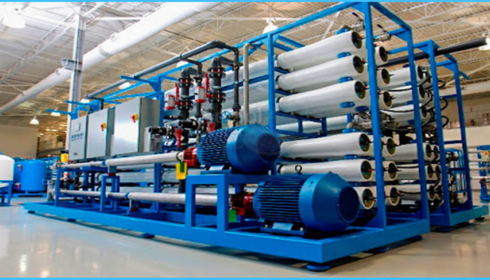
There’s something oddly satisfying about clean, clear water running through a system — whether that’s your office ice maker, a manufacturing line, or a hotel’s boiler system. Yet behind that clarity lies a complex network of technology, filters, and maintenance that most of us don’t think twice about. Until, of course, something goes wrong. And when it comes to running a business, water isn’t just water anymore — it’s an essential resource that can make or break efficiency, cost, and even reputation.
The Hidden Cost of “Just Water”
If you’ve ever dealt with scaling in your pipes or cloudy water in your facility, you already know how destructive untreated water can be. Minerals like calcium and magnesium build up over time, clogging lines, corroding equipment, and shortening the lifespan of everything from cooling towers to dishwashers. The truth is, many companies don’t realize how much money they’re literally flushing away until it’s too late.
That’s where commercial water treatment steps in — not as an optional upgrade, but as a necessity for any modern business that relies on water in its operations. Whether it’s a restaurant ensuring crystal-clear ice cubes or a manufacturing plant maintaining water purity for production, water treatment systems are quietly becoming the unsung heroes of operational success.
More Than Filters and Tanks — It’s About Strategy
It’s easy to think of water systems as plug-and-play: install, forget, and move on. But smart businesses now treat water management like energy efficiency — as part of their long-term sustainability strategy. In fact, companies are investing in comprehensive audits to understand where they’re losing efficiency, where waste is happening, and how they can reuse or recycle water more intelligently.
These systems do more than clean water — they optimize it. The data collected from sensors and controllers helps operators adjust flow rates, track usage, and predict maintenance issues before they cause downtime. This isn’t just eco-conscious; it’s economically smart.
How Industrial Innovation is Reshaping Water Use
In the past, water treatment used to be purely reactive — something you called a specialist for when things went wrong. Today, thanks to advanced industrial water solutions, businesses can prevent problems before they ever happen. These solutions combine chemical management, filtration technology, and digital monitoring in one integrated approach.
For example, a brewery might install a real-time pH monitoring system to ensure that every batch of product maintains quality consistency. Or a hotel might use automated dosing systems to keep its boilers free of scale, cutting energy consumption dramatically. The result? Cleaner systems, lower operating costs, and happier customers — all achieved quietly in the background.
Reverse Osmosis: The Unsung Workhorse
If there’s one technology that deserves more recognition in the business world, it’s reverse osmosis (RO). Originally designed for desalination, RO has become one of the most efficient ways to produce ultra-pure water for industries ranging from food processing to pharmaceuticals.
Modern reverse osmosis systems for businesses aren’t the bulky, maintenance-heavy setups of the past. They’re compact, efficient, and smart. Many are now IoT-enabled, allowing facility managers to monitor pressure levels, filter life, and water quality in real time from a dashboard or even a mobile app. It’s an incredible leap from traditional setups that required constant manual testing.
And it’s not just about the water itself — it’s about what that water protects. High-quality RO systems preserve the integrity of industrial equipment, prevent contamination in sensitive processes, and ensure consistent results day after day. In sectors like healthcare or beverage production, that consistency isn’t a luxury — it’s a requirement.
Sustainability Meets Profitability
Let’s face it: sustainability often gets framed as an expense, but smart water treatment proves the opposite. The same systems that reduce waste also reduce cost. When you recycle rinse water, optimize flow rates, and eliminate scaling, you’re not just protecting the planet — you’re protecting your bottom line.
Many companies now highlight their water management systems in ESG (Environmental, Social, and Governance) reports to showcase commitment to resource responsibility. It’s a subtle but powerful way to build brand trust — especially with environmentally conscious clients and investors.
Small Changes, Big Results
You don’t have to be running a massive industrial operation to benefit. Even small businesses are seeing major returns from installing high-efficiency filters, softeners, and monitoring systems. For instance, a small café that filters its brewing water can instantly taste the difference in its coffee, while extending the life of its espresso machine. It’s the same principle, scaled down — cleaner water equals smoother operations.
And when businesses start thinking long-term, they often discover that water treatment pays for itself. Reduced maintenance costs, fewer system failures, and lower energy consumption add up fast.
The Future of Smart Water
The next frontier in water treatment isn’t just about purification — it’s about intelligence. With AI-driven monitoring, predictive analytics, and smart automation, future systems will adjust themselves dynamically based on changing conditions. They’ll clean when needed, conserve when possible, and communicate before issues arise.
As water scarcity becomes a growing global concern, these innovations won’t just be nice to have — they’ll be essential. Businesses that invest in smarter systems today will find themselves far better prepared for tomorrow’s challenges.
Closing Thoughts
In the end, water tells a story. It’s a story about responsibility, innovation, and foresight. Clean water keeps the gears of commerce turning — literally and figuratively. From high-rise offices to industrial plants, it’s the invisible foundation of everything we do.
So, the next time you turn on a tap at your business, think beyond the clear stream. Think of the systems working tirelessly behind the scenes, the technology that makes every drop count, and the commitment it represents to efficiency and sustainability.
Because when your water works smarter, so does your business.
